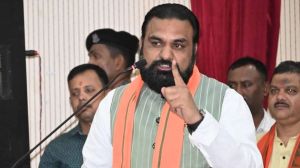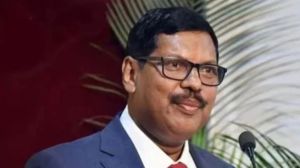I didn’t blame the Trustees, says UTI chief
This newspaper published an interview of UTI chief M. Damodaran on May 19(‘The government will make good the shortfalls’). As the ...

This newspaper published an interview of UTI chief M. Damodaran on May 19(‘The government will make good the shortfalls’). As the interview lasted an hour and 20 minutes, replies to some questions were combined, and compressed. Damodaran has sent the following clarifications:
* The interview contains a reference to the fact that the investment decisions were by UTI chairman and by late M.M. Kapur, executive director. One of the questions posed was whether following a reduction in the retirement age from 60 years to 58 years, fund management skills at senior levels were no longer available in the organisation. In response thereto, I had indicated that those who superannuated at the age of 58 years following the reduction in the age of superannuation were not persons dealing with fund management and that earlier fund management at senior levels was in the hands of the chairman and late M.M. Kapur, executive director.
* There is also a reference to some of the trustees of UTI by name and a statement attributing ‘collective failure of sorts.’ UTI had been successfully launching assured return schemes from 1982 and had given the investors whatever had been assured. I had also indicated that in late 1996 a decision was taken to resume assured return schemes for 1997 (after a brief spell of non-assured return schemes), because some DFIs had been offering investment opportunities with high-assured returns and it was felt that if UTI did not offer assured return schemes, the investors of some of the UTI schemes which were maturing in 1997 would avail of the investment opportunities of the DFIs and not of UTI schemes.
I had also indicated that subsequent to the introduction of assured return schemes from 1997, the responsibility for paying tax on income shifted from the investor to the fund, placing an additional burden on the fund while giving tax-free returns to the investor. The schemes also had over time a high percentage of NPAs. Interest rates had moved southwards rendering the level of assured returns unviable. Further the equity component of the portfolio had also under-performed. These were factors which could not have been foreseen by the trustees while floating the assured return schemes. In that context, I had mentioned that most of the well-known names in the financial sector were at one point of time trustees of UTI. I had also clearly indicated that Tarapore was not a trustee when the now maturing assured return schemes were launched and that Bajpai who was a trustee till recently, possibly came in as trustee after the assured return scheme were launched and that Mohan was a trustee when one of the assured return scheme was maturing. The reply to the same question speaks of corporates redeeming units in May. Redemption by corporates and others in May was in US-64 and not in the assured return schemes and it did send alarm signals based on which sale and repurchase of units were frozen from July 1, 2002.
The last sentence in the interview refers to our servicing the Malegam Committee round-the-clock. What was mentioned was that the Tarapore Committee (and not the Malegam Committee) which was given 3 months had to work round-the-clock and the officers who were required to make information available to that Committee had also to put in similarly long hours.



- 011 day ago
- 0224 hours ago
- 031 day ago
- 041 day ago
- 051 day ago




























